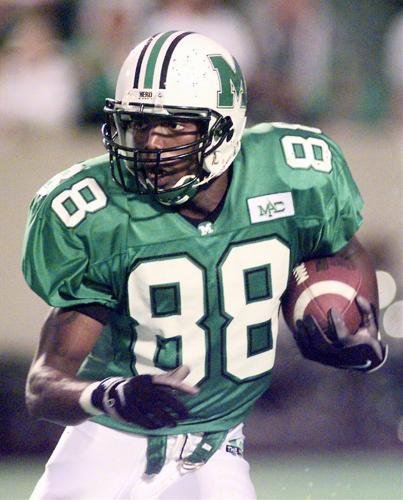
Table Of Contents
Introduction to Randy Moss
Randy Moss is indisputably one of the most influential figures in the realm of American football. Revered for his unparalleled skills on the field, Moss has earned a commendable reputation as one of the greatest wide receivers of all time. His career trajectory, from the raw talent discovered in the humble streets of West Virginia to his transformation into a football legend at Marshall University, is both inspiring and testamentary to his commitment and prowess.
Rising to prominence in the late 1990s, Randy Moss redefined the standards for wide receivers in the National Football League (NFL). His combination of speed, agility, and an uncanny ability to catch seemingly uncatchable passes made him a nightmare for opposing defenses and a darling for fans and teammates alike. Moss’s name has become synonymous with exceptional athleticism and a competitive spirit that leaves an indelible mark on the sport.
Throughout his career, Moss played for multiple NFL teams, including notable stints with the Minnesota Vikings and the New England Patriots. Each team left with no doubt about his dominant capabilities on the gridiron. His impact stretched beyond his on-field performances, influencing training regimes, playbook strategies, and even the overall approach to the wide receiver position itself.
To understand Randy Moss’s journey is to appreciate not only his numerous records and accolades but also his profound influence on the game of football. A deeper dive into his early years, college triumphs, and professional exploits reveals a storied career that continues to inspire future generations of athletes. With a legacy that remains vibrant and relevant, Randy Moss stands not just as a football legend, but as an enduring icon in American sports history.“`
Early Life in West Virginia
Randy Moss was born on February 13, 1977, in Rand, a small town in West Virginia. Raised in a close-knit community, Moss experienced a childhood deeply rooted in family and local traditions. His upbringing was marked by a strong support system, with family members and neighbors playing vital roles in his early development.
Sports were a significant part of life in Rand, and the young Moss displayed a natural talent for athletics from a very early age. Whether it was playing basketball in the local gym or catching footballs in the neighborhood, his prodigious skills soon caught the attention of everyone around him. His mother, Maxine Moss, often spoke about Randy’s insatiable love for various sports and how he would spend hours perfecting his craft.
The local environment and community deeply influenced Randy Moss’s character and drive. Growing up in a town where hard work and perseverance were essential values, Moss internalized these principles, which would later become cornerstones of his athletic success. Stories abound about Moss outmatching older kids in local football games, reflecting his extraordinary talent and competitive spirit even as a child.
Anecdotes from his youth frequently highlight his dedication and love for football. One such story involves Moss showing up at the local high school field at dawn, long before his peers, to work on his speed and agility. His early exposure to a supportive community that celebrated sports achievements undoubtedly contributed to his eventual rise as a football legend.
In sum, Randy Moss’s early life in Rand, West Virginia, provided the foundation for a remarkable career in sports. The combination of a supportive community, a close-knit family, and an environment that celebrated athleticism undeniably shaped his path to becoming a football icon. His story is a testament to the powerful influence of one’s roots in achieving greatness.
Randy Moss’s journey to becoming a football legend began at DuPont High School in West Virginia, where his athletic prowess quickly set him apart. A multi-sport talent, Moss excelled not only on the football field but also in basketball and track, showcasing his versatility and extraordinary abilities across various disciplines.
In football, Moss was a dominant force, playing as a wide receiver and defensive back. His speed, agility, and catching ability were immediately apparent, making him a standout player. During his high school career, Moss amassed impressive statistics, including over 4,200 all-purpose yards and 54 touchdowns. His remarkable performances earned him numerous accolades, such as being named to the Parade High School All-American team twice, an honor reserved for the nation’s top high school football players.
Basketball was another arena where Moss shone brightly. His exceptional aptitude for the sport led DuPont High School to successive state championships. Moss’s athletic ability on the court was highlighted by his leaping ability and quick reflexes, skills that would later translate effectively to his football career. Moreover, Moss scored more than 1,000 points in his high school basketball career, solidifying his reputation as a multi-faceted athlete.
In track and field, Moss demonstrated his outstanding speed and power. He broke numerous records, including the state record in the 100-meter dash with a time of 10.96 seconds. His achievements in track showcased his incredible athleticism and further underscored his versatile talent.
Randy Moss’s high school career at DuPont High School set the stage for his future success in college and professional sports. His multi-sport proficiency, particularly his dominance in football, established him as a remarkable athlete capable of excelling at the highest levels. These early years were crucial in shaping Moss’s path to becoming a legend in the world of football.
Challenges and Transfer to Marshall University
Randy Moss’s journey to becoming a football legend was marked by several significant challenges that profoundly impacted his career trajectory. Originally, Moss had committed to playing college football at the University of Notre Dame, a prestigious institution known for its strong athletic programs. However, his career at Notre Dame was derailed by legal issues. In 1995, Moss was involved in a fight at his high school that led to a misdemeanor battery charge, resulting in Notre Dame rescinding his scholarship offer.
Subsequently, Moss enrolled at Florida State University, a powerhouse in college football. Yet, his troubles continued when he tested positive for marijuana, leading to his dismissal from the team. These setbacks could have ended his football career, but they instead became catalysts for a pivotal transition that would define his future path.
In 1996, Moss transferred to Marshall University in Huntington, West Virginia, a move that proved to be highly significant. At Marshall, Moss found an environment where he could revive his career and showcase his immense talent. His transfer happened at a time when Marshall University was transitioning from Division I-AA to Division I-A, giving Moss a platform to compete at a higher level while contributing to the team’s ascension in college football ranks.
This period of upheaval and recovery not only highlighted Moss’s resilience but also shone a spotlight on his exceptional football abilities. At Marshall University, he set numerous records, earning All-American honors and propelling the team to remarkable successes. His time at Marshall demonstrated that, despite challenges and setbacks, his athletic prowess could not be denied. This turning point was crucial, as it paved the way for his subsequent entry into the National Football League (NFL) and an illustrious professional career.
Dominance at Marshall
Randy Moss’s tenure at Marshall University remains undoubtedly one of the most influential periods in the history of the football program. Arriving at Marshall in 1996, Moss quickly cemented himself as a vital asset to the team, showcasing phenomenal athletic prowess and an unmatched ability to turn the tide of any game.
Statistically, Moss’s record with the Thundering Herd is nothing short of impressive. In his debut season, he set a freshman record with a staggering 14 touchdowns. Moss continued to dominate defenses as he amassed 1,709 receiving yards and secured 28 touchdown receptions, setting the foundation for the team’s impressive 15-0 season. His extraordinary performance didn’t just stand out within the team but also left a mark on collegiate football, earning him the 1996 Division I-AA National Championship and the prestigious Biletnikoff Award in the following year.
One of the most memorable games of Moss’s college career was against the University of Montana during the 1996 championship framework. Moss’s unstoppable force on the field was on full display as he caught nine passes for 220 yards and four touchdowns, leading Marshall to a definitive 49-29 victory. Additionally, his contributions in the subsequent season, especially against the University of Nevada, further illustrated his importance as he recorded nine catches for 153 yards and a decisive touchdown.
Moss’s presence not only propelled the team’s performance on the field but also significantly boosted the visibility and reputation of Marshall University’s football program at a national level. His extraordinary skills drew widespread media attention and attracted numerous scouts, highlighting Marshall as a breeding ground for professional-level talent. Randy Moss’s impact was transformative, setting a new benchmark for excellence in college football and leaving an enduring legacy that propelled Marshall University into the limelight.
NFL Career and Legacy
After an illustrious college career, Randy Moss made a seamless transition to the National Football League (NFL). He was drafted in the first round, 21st overall, by the Minnesota Vikings in the 1998 NFL Draft. Moss’s rookie season with the Vikings was nothing short of spectacular; he set a rookie record with 17 receiving touchdowns, earning him the NFL Offensive Rookie of the Year award. His exceptional speed, leaping ability, and hands made him an instant sensation and a cornerstone of the Vikings’ high-powered offense.
Moss’s time with the Vikings solidified his status as one of the premier wide receivers in the league. Over seven seasons, he amassed numerous accolades, including five Pro Bowl selections and three First-team All-Pro honors. He formed a formidable duo with quarterback Daunte Culpepper, and their chemistry produced some of the most memorable offensive performances of the early 2000s NFL seasons.
In 2005, Moss found a new home with the Oakland Raiders before being traded to the New England Patriots in 2007. The move to the Patriots revitalized Moss’s career. During his first season in New England, he broke the single-season record for receiving touchdowns with 23, a record that still stands today. Moss played a pivotal role in the Patriots’ unbeaten regular season in 2007, although the team ultimately fell short in the Super Bowl.
Moss also had brief stints with the Tennessee Titans and the San Francisco 49ers before retiring. His career statistics are a testament to his dominance on the field: 982 receptions, 15,292 receiving yards, and 156 receiving touchdowns. Moss ranks fourth all-time in receiving yards and second in receiving touchdowns, underscoring his lasting impact on the sport.
Beyond the numbers, Randy Moss’s legacy is defined by his game-changing ability and his capacity to alter defenses single-handedly. He was inducted into the Pro Football Hall of Fame in 2018, cementing his place among the all-time greats. For fans and players alike, Moss’s career serves as an enduring inspiration and a benchmark for excellence in professional football.
Off-Field Influence
Randy Moss, while widely celebrated for his exceptional football career, has also made significant contributions off the field, underscoring his multifaceted impact. Beyond the touchdowns and athletic accolades, Moss’s media presence has been remarkable. As a charismatic analyst for ESPN, he transitioned seamlessly from athlete to commentator, offering insightful perspectives that draw from his extensive experience. His straightforward and engaging style has resonated with fans and viewers alike, expanding his influence beyond the gridiron.
Moss’s commitment to his roots in West Virginia is evident through his numerous philanthropic efforts. He has been actively involved in various community projects, aiming to give back to the region that shaped his early life. His initiatives include supporting local youth through sports camps and mentorship programs, as well as contributing to educational causes. Moss’s generosity extends to charity events and fundraisers, often focusing on underprivileged communities, which highlights his enduring connection to his hometown values.
Additionally, Moss’s impact is seen in his efforts to address social and racial issues. His candid discussions about the challenges faced by African-American athletes have helped to bring awareness and foster dialogue around these important topics. By utilizing his platform, Moss advocates for equality and justice, influencing not only his fanbase but also the broader sports community.
Randy Moss’s life off the field reflects a blend of his steadfast West Virginia roots and a commitment to making a positive difference. Whether through his engaging media presence, philanthropic ventures, or advocacy for social causes, Moss continues to display the values of hard work, community, and integrity. His legacy, therefore, extends well beyond his achievements in football, cementing his role as a significant contributor both on and off the field.“`html
Conclusion: A Lasting Impact
Randy Moss’s journey from West Virginia to becoming a football legend is a testament to his remarkable talent, relentless work ethic, and the influence of his early life experiences. Starting in Rand, West Virginia, Moss faced numerous challenges but also found opportunities that would lay the foundation for his future success. It was in West Virginia that he developed his skills, resilience, and ambition, which he carried with him to Marshall University and beyond.
Moss’s time at Marshall University was marked by extraordinary athletic achievements, making him a standout player who would eventually draw the attention of the NFL. His remarkable performances at Marshall embodied not just his personal prowess but also symbolized hope and possibility for future athletes from small towns. Through his career in the NFL, Moss’s ability to consistently deliver breathtaking plays served as an inspiration to many aspiring football players.
The legacy of Randy Moss extends far beyond his statistical records and accolades. It is reflected in the spirit and dreams of countless young athletes who see in his story a path to overcome obstacles and achieve greatness. Moss’s influence is evident in the way current players approach the game, drawing inspiration from his competitiveness, skill, and dedication. His contributions to football have ensured that his name will be remembered for generations.
Ultimately, Randy Moss’s beginnings in West Virginia played a critical role in shaping the legend he became. They provided the backdrop against which he honed his craft and built his character, elements that were essential to his rise in the world of football. His journey from the humble fields of Rand to the grand stadiums of the NFL is not just a story of personal triumph but a beacon of inspiration, demonstrating that greatness can emerge from anywhere.







